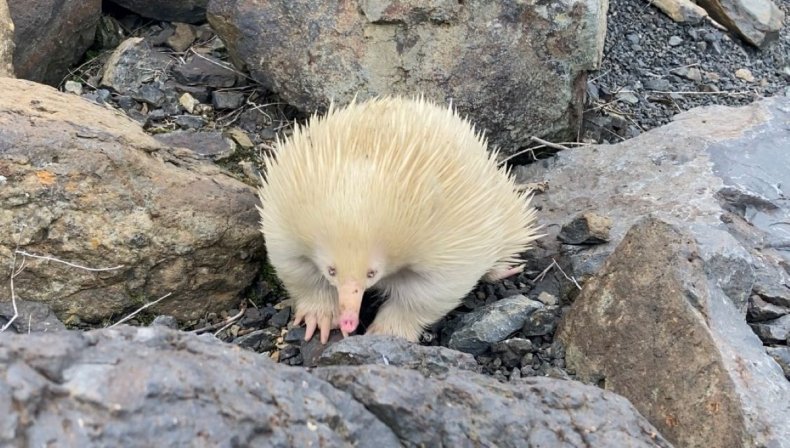Extremely Rare White Echidna Spotted in the Wild: 'Amazing Find'
An extremely rare white echidna has been spotted roaming the streets of an Australian city.
The snow-colored spine ball was seen wandering around Bathurst, which is about 120 miles northwest of Sydney in New South Wales. The local councilor who spotted it on Tuesday afternoon named it Raffie, after the Raffaello coconut truffles made by Ferrero.
"Short-beaked echidnas are very shy and somewhat elusive as it is, but to come across an albino short-beaked echidna is very rare," a representative for Bathurst Regional Council told Newsweek.

The animal's coloring is the result of a genetic condition known as albinism, which prevents its body from producing the pigment melanin.
Bathurst council posted photos of the echidna on its Facebook page, saying Raffie was "too beautiful not to share."
"How beautiful!!! And how lucky we are to have him/ her in our own Bathurst backyard," wrote one user.
Short-beaked echidnas are widely distributed throughout Australia. However, it is rare to see them in the wild because of their reclusive nature. The short-beaked echidna is easily identified by its sharp spines, short legs and long snout, according to the Australian Museum.
"Their spines act as a line of defense against predators," the Bathurst council representative said. "When they are faced with a predator, they will roll up into a ball or with their spikes sticking out, or will shuffle and dig themselves into the soil for safety."
Echidnas and duck-billed platypuses are the only mammals that lay eggs. About a month after mating, the female echidna will deposit a single soft-shelled egg into her pouch, which hatches after only 10 days.
Short-beaked echidnas have an incredibly important role to play in their local environment and are often described as "ecosystem engineers."

They "spend an incredible amount of time digging, scratching and moving soil in search of food such as termites and ants," the Bathurst representative said.
"This digging and moving of soil improves soil health by turning over and mixing organic matter. It breaks up hard soils that would otherwise be impenetrable to plant seedlings and it improves water filtration, which increases soil moisture.
"They also contribute to the spread of mycorrhizal fungi, which is incredibly important to plant health and biodiversity as this type of fungi helps native plants increase their absorption of nutrients from Australia's nutrient-poor soils."
However, habitat loss and predation pose a significant threat to this important species, as do cars.
Bathurst Regional Council will continue to monitor Raffie and has encouraged local residents to keep their eyes peeled and report any sightings.
"We encourage the public to get involved in citizen science and submit their sightings of short-beaked echidnas and any native animals that we have in our region to Echidna CSI or iNaturalist," it said.
"However, we do ask that if you do encounter Raffie or any other native wildlife that demonstrates albinism to please not identify their location for their protection."








